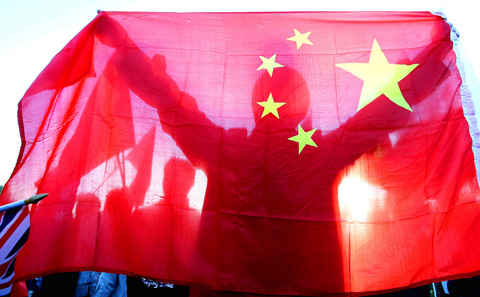Beijing abruptly shut the door yesterday on most foreign media seeking to cover the Olympic torch’s ascent of Everest after journalists objected to last-minute changes to travel and reporting plans.
China plans to take a special high-altitude Olympic torch to the summit of the world’s tallest peak next month and had invited world media to cover the event as a triumphant symbol of Beijing’s hosting of the Olympics.
But last-minute Chinese changes to coverage arrangements called for a rapid and tightly controlled trip of about three days through riot-hit Tibet to the Mount Everest base camp.

PHOTO: AFP
Reporters objected, saying that ascending too quickly to the camp’s elevation of 5,150m could cause severe health problems.
After foreign media requested a more paced trip, Games organizers set a sudden morning payment deadline yesterday for air tickets to Lhasa.
The situation descended into farce when the Olympic official charged with collecting payment refused to accept fees from several international news agencies present.
The payments of some foreign media had been accepted earlier.
Meanwhile, a Chinese primary school teacher and a beautician have filed a suit against CNN in New York over remarks they say insulted the Chinese people and are seeking US$1.3 billion in compensation — US$1 per person in China, a Hong Kong newspaper said.
The case against the Atlanta-based cable channel, its parent company Turner Broadcasting and Jack Cafferty, the offending commentator, comes after 14 lawyers launched a similar suit in Beijing alleging that Cafferty’s remarks earlier this month violated the dignity and reputation of the Chinese people.
Cafferty said the US imported Chinese-made “junk with the lead paint on them and the poisoned pet food” and added: “They’re basically the same bunch of goons and thugs they’ve been for the last 50 years.”
CNN said Cafferty was expressing an opinion about the Chinese government.
In New York, beautician Liang Shubing and Beijing teacher Li Lilan said Cafferty’s words insulted all Chinese people and “intentionally caused mental harm” to the plaintiffs, the Ta Kung Pao newspaper reported yesterday.
China on Thursday reassured foreigners they were welcome at the Beijing Olympics in August and guaranteed their safety after a wave of anti-Western protests.
In related developments, in Canberra, a sea of red Chinese flags welcomed the Beijing Olympic torch relay yesterday, as thousands of Chinese supporters attempted to drown out emotional pro-Tibet protests.
Shortly after fireworks exploded in the pre-dawn darkness in celebration of the torch, raucous chanting between the two groups began.
Thousands of Chinese, mostly students, who had taken overnight buses to Canberra, turned out to support the relay.
Relations between Australian police and the torch’s blue-and-white tracksuit-clad Chinese escorts appeared strained.
Police on several occasions pulled one of the Chinese away from the torch, determined that the so-called flame attendants, who were described as thugs by a London Olympic official, would not have a security role at the event.

The US government has signed defense cooperation agreements with Japan and the Philippines to boost the deterrence capabilities of countries in the first island chain, a report by the National Security Bureau (NSB) showed. The main countries on the first island chain include the two nations and Taiwan. The bureau is to present the report at a meeting of the legislature’s Foreign Affairs and National Defense Committee tomorrow. The US military has deployed Typhon missile systems to Japan’s Yamaguchi Prefecture and Zambales province in the Philippines during their joint military exercises. It has also installed NMESIS anti-ship systems in Japan’s Okinawa

‘WIN-WIN’: The Philippines, and central and eastern European countries are important potential drone cooperation partners, Minister of Foreign Affairs Lin Chia-lung said Minister of Foreign Affairs Lin Chia-lung (林佳龍) in an interview published yesterday confirmed that there are joint ventures between Taiwan and Poland in the drone industry. Lin made the remark in an exclusive interview with the Chinese-language Liberty Times (the Taipei Times’ sister paper). The government-backed Taiwan Excellence Drone International Business Opportunities Alliance and the Polish Chamber of Unmanned Systems on Wednesday last week signed a memorandum of understanding in Poland to develop a “non-China” supply chain for drones and work together on key technologies. Asked if Taiwan prioritized Poland among central and eastern European countries in drone collaboration, Lin

BACK TO WORK? Prosecutors said they are considering filing an appeal, while the Hsinchu City Government said it has applied for Ann Kao’s reinstatement as mayor The High Court yesterday found suspended Hsinchu mayor Ann Kao (高虹安) not guilty of embezzling assistant fees, reducing her sentence to six months in prison commutable to a fine from seven years and four months. The verdict acquitted Kao of the corruption charge, but found her guilty of causing a public official to commit document forgery. The High Prosecutors’ Office said it is reviewing the ruling and considering whether to file an appeal. The Taipei District Court in July last year sentenced Kao to seven years and four months in prison, along with a four-year deprivation of civil rights, for contravening the Anti-Corruption

NO CONFIDENCE MOTION? The premier said that being toppled by the legislature for defending the Constitution would be a democratic badge of honor for him Premier Cho Jung-tai (卓榮泰) yesterday announced that the Cabinet would not countersign the amendments to the local revenue-sharing law passed by the Legislative Yuan last month. Cho said the decision not to countersign the amendments to the Act Governing the Allocation of Government Revenues and Expenditures (財政收支劃分法) was made in accordance with the Constitution. “The decision aims to safeguard our Constitution,” he said. The Constitution stipulates the president shall, in accordance with law, promulgate laws and issue mandates with the countersignature of the head of the Executive Yuan, or with the countersignatures of both the head of the Executive Yuan and ministers or